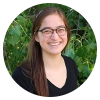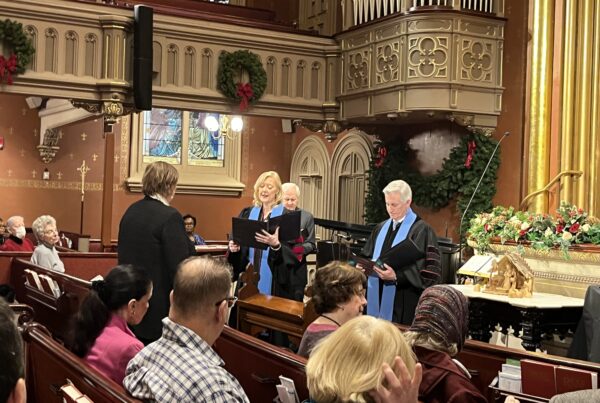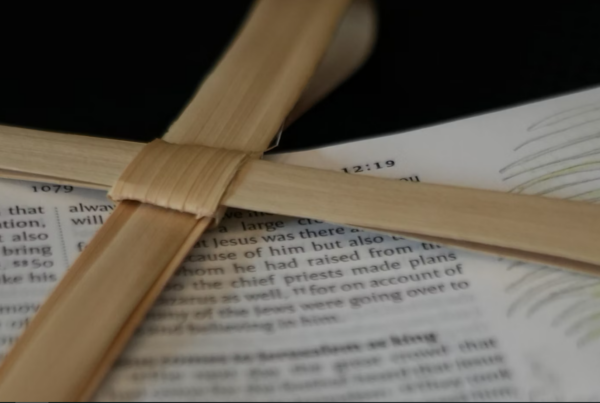In early 2023, pastor Kurt Bush took a three-week “mini-sabbatical,” made possible by a clergy revitalization grant from the Reformed Church in America’s Board of Benefits Services. Admittedly, Bush didn’t know how much he needed that time of structured rest. But it turned out to be a powerful period of discerning the will of God for his life, particularly leaning into things that are life-giving. In this Q&A, Bush describes his discernment process, his findings, and the results.
Entering into your mini-sabbatical, what became clear to you right away?
I was really tired and rundown. The first week of my mini-sabbatical, I had to unplug, but it became clear to me that my life was too busy. Too many things were clouding my understanding of God’s calling, too many factors that I allowed to distract. I had to get away from those things to hear from the Lord.
I also realized that I, unintentionally, carried a way of thinking about calling and vocation that led me to believe that ministry would be exclusively seasons that are really hard—that my call will only be draining. My first formation allowed me very little freedom for me to do things that I actually enjoy and bring me life. My way of thinking, even as a 30-something adult, was that it’s selfish to think about things that give me life; it’s a slippery slope to self-indulgence. I just don’t think that needs to be the case anymore.
Related: Balancing work and rest sustains my call as a pastor
What did you discern about your calling during your time of rest?
Most of the discernment happened around getting honest about what gives me life, what I love. Those are probably indicators that I should pay attention because this might be something that is in line with God’s call.
My leadership coach helped frame questions around the idea that any call we may have is a double-edged sword: some of the work we do is just that, work, while some of the work truly does bring life and energy! My coach helped me understand that I have agency in deciding that ratio—and that it’s okay to ask the question of what that ratio looks like in my life.
So I outlined where I find energy, and figured out why I find energy there. And I realized I love helping people with their own work. I love that moment when people say, “Oh, that’s a good question.” That really felt fruitful and God-honoring. I realized I want to do more of that because I think I have something to offer to people who feel stuck, overwhelmed, exhausted, or anxious.
I felt really strongly that God has called me into this work with people and to serve Trinity Church in this way. But I also realized that there are opportunities to do this work with people even outside the four walls of the church. Chris Godfredsen and I have launched a coaching practice, called Brimstone Coaching Group. It’s a calling that’s outside of our pastoral roles, to pour into people in our region. It’s been life-giving for us and a way we can contribute. It’s like Frederick Buechner said—my deep gladness meets the world’s great need (Wishful Thinking: The Seeker’s ABCs).
Once you’ve discerned what is (or is not) life-giving, how can you tell if what you’re hearing is from God?
I try to be aware of what’s stirring me, asking where do I feel most alive? But I know those feelings can lead me astray.
So my next step, since my sabbatical, has been to ask questions of three or four close friends. What do they see in me? What do they sense God is doing? I believe God shows up in those relationships. The clearest moments of affirmation in my life have happened through people. It’s not God putting his will on a neon sign. I know my friends are seeking the Lord and the flourishing of God’s kingdom. And they will help me discern if something feels out of alignment.
I talk to a lot of people. Great transformation in my life has happened when someone asks tough questions.
When do you best hear from God? What helps, or doesn’t?
I believe deeply that solitude with God is vital. The clearest times of discernment God has given me are when I’m most ready to listen, when I’m most curious, and when I’m most interested in hearing.
In my own life, I can’t hear well from God without some rhythm of sabbath rest. If I don’t create that space throughout the week, I won’t hear well. “Cloudy” is the best word for it. I want to hear from God and fill up my life, but that’s never worked for me. It’s hard to create that space, but I don’t know any other way to discern well.
I block off a whole day, Monday. I read somewhere that if a person primarily works with their mind, they should sabbath with their hands, and vice versa. God created us as whole beings, so I try to sabbath with my hands. I’ll organize something or do something “productive.” I hate checklists, but on Monday, a checklist feels great. Sabbath looks like doing stuff with my hands.
Additionally, our church staff does an hour of solitude each month, which I participate in. And I try to do a quarterly day of retreat, to just be in solitude.
What wisdom could you share with others who are discerning the will of God?
I’ve noticed since my sabbatical that sometimes my discernment process still involves a fear that I will make the wrong decision, which is a holdover from my first formation. For a long time, I believed that “right” is the decision that God will honor, and “wrong” is what will bring God’s anger or disappointment. I don’t know that there’s a “wrong” decision. There’s probably one that God prefers. But I don’t believe there is a decision that we can make that will separate us from God’s favor.
If I can trust that if I’m seeking the Lord in faithfulness, that God will not separate himself from me, that changes how I discern. If we equate “wrong” with God changing how he thinks about us, I don’t think that’s true or helpful. What if we believe that God loves us deeply, and is for us? That comfort goes a long way when you’re trying to hear from God and act accordingly.
Becky Getz is a writer and editor for the Reformed Church in America's communication team. You can contact Becky at bgetz@rca.org.
Rev. Kurt Bush
Kurt Bush serves on the pastoral staff at Trinity Reformed Church in Orange City, Iowa, and serves as the campus pastor for Trinity’s Hospers campus. Additionally, Kurt is the co-founder of the Brimstone Coaching Group. Kurt is married to Amber and has two children, an eighth grader and a fifth grader. Kurt is passionate about helping individuals lean into the work of wholeness and shalom God invites us into even today, as well as seeing his community know shalom and flourishing.




